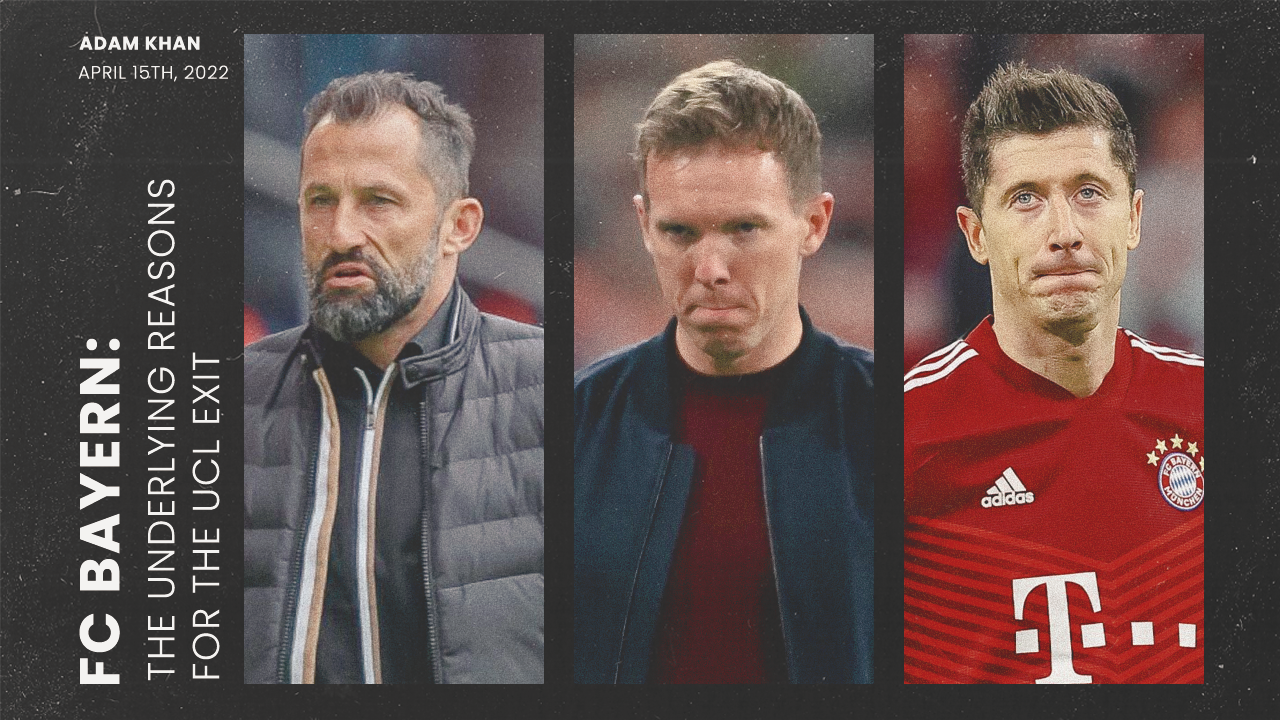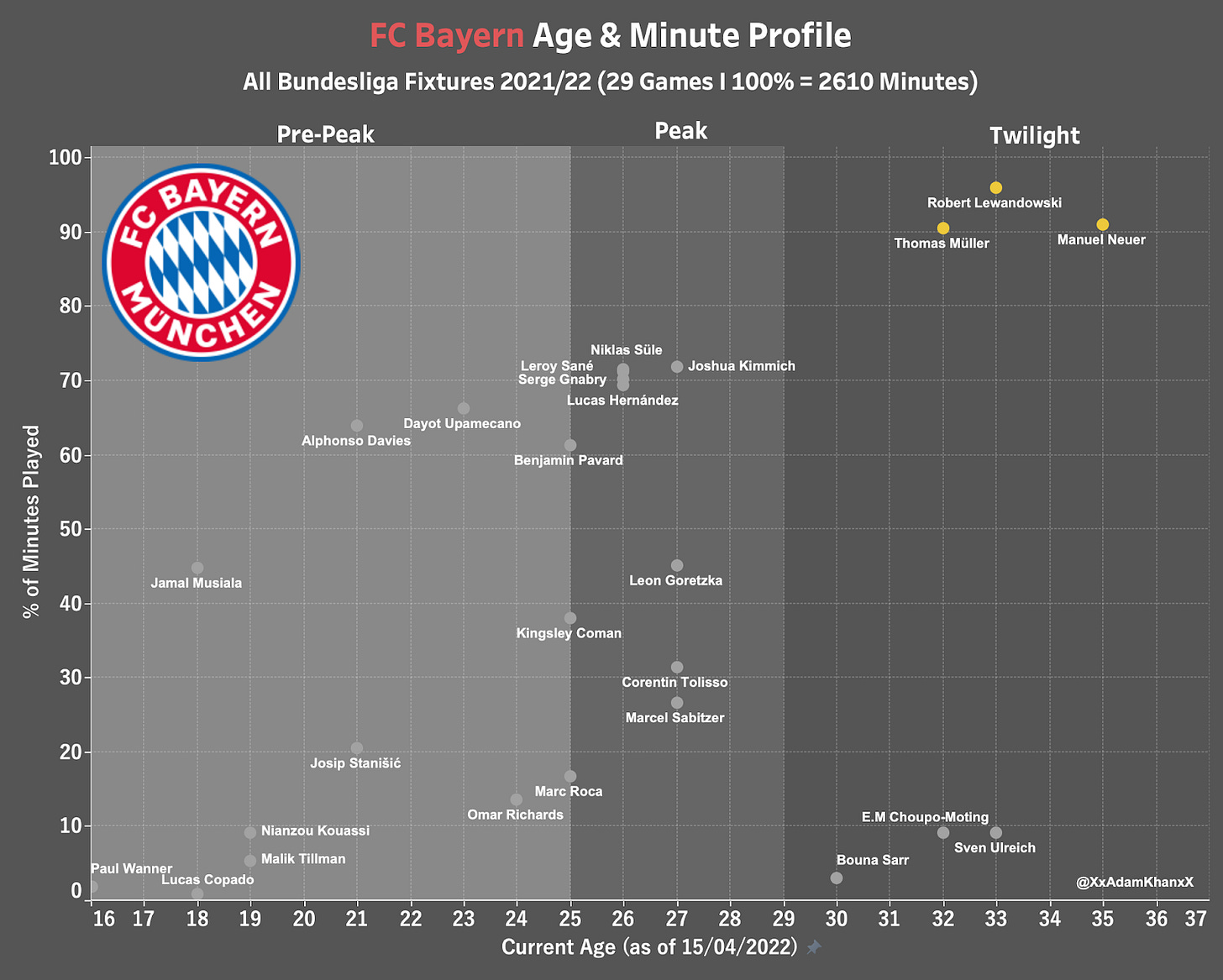ISSUE #30: The Underlying Reasons Behind F.C. Bayern's Champions League Exit
For the 2nd time in 2 seasons FC Bayern have been eliminated in the quarter-finals of the UCL. Today we look at the underlying reasons for the modern stagnation and the premature European exit.
For the second time in two seasons FC Bayern have been eliminated from all cup competitions by mid-April.
At a club dripping with Champions League pedigree and dominating the domestic scene, it simply isn't good enough.
In today’s edition of The German Football Weekly, we look at the underlying reasons for FC Bayern’s modern stagnation and the premature European exit.
Individual Mismanagement & Contract Chaos
Probably the biggest figure for criticism across this whole ordeal has been Hasan Salihamidžić - former player and sporting director for the Bavarian giants since 2017.
In his time in charge, Bayern have won 2 DFB-Pokals, 4 league titles, and 1 Champions League, however these on-field successes have often just papered over the widening cracks spreading off it.
From his public fall-out with Hansi Flick, to his inability to convince team members of their long-term value, multiple events have shown a lack of the requisite interpersonal skills that should be key in his administrative role.
And while in isolation the shocking exit of David Alaba can be chalked down to the overzealous financial demands from the player in question, the fact that less than 12 months later Niklas Süle sighted “insufficient valuation” for his own exit provides a worrying trend of events creeping into the Sabener-Straße.
Nor are these the only bad headlines landing at the doorstep of the new management duo of Oliver Kahn (F.C. Bayern CEO) & Salihamidžić!
The futures of Corentin Tolisso is still to be decided despite the French international entering the final weeks of his contract, Thomas Müller announced in February that he’s yet to even be approached concerning his own expiring deal, while just this week rumors spread feverishly across Twitter linking Robert Lewandowski with a premature exit to FC Barcelona.
On their own these episodes can be perceived as the natural by-product of running a massive football club, but all together it provides a worrying depiction of an unsettled locker room and disjointed team. Particularly in the final leg of a season, when crucial matches begin piling up, any off-field noise is precisely what one doesn’t need in order to be successful.
Here is what former FC Bayern CEO Karl-Heinz Rummenigge (2002-2021) had to say in a Kicker interview about the reasons behind the significant unrest brewing around the club,
“What is striking is that there are constant discussions about contracts in the media. First Joshua Kimmich, then Leon Goretzka, Kingsley Coman and now Manuel Neuer, Thomas Müller, Robert Lewandowski and Serge Gnabry. We're now in the last quarter of the season, so that's far from ideal. It causes unrest in the club, and you can feel it.”
When one player is looking to force an exit, the other is uncertain where his future lies, and the next is disgruntled at the meager salary he earns compared to his under performing teammate (I.e Kingsley Coman), a breakdown between the relationship of club and player will inevitably explode out onto the pitch.
Dietmar Hamann, a former Champions League winner at Bayern, hit the nail on the head with his comments for his Sky Sports column this week,
“In the olden days, the opponents didn't just play against eleven men, but against an entire club. Bayern have always distinguished themselves by their unity. This cohesion, this respect for each other, and this power that they were always able to generate is missing at the moment.”
Transfer Flops
Whilst not solely responsible for talent recruitment, Hasan Salihamidžić has played a significant role in FC Bayern’s transfer business in the past 3 seasons.
It’s safe to say it hasn’t gone as planned.
Since the summer of 2019, Der Rekordmeister has spent roughly €250m (not to mention the wages) on 14 permanent signings. The likes of Lucas Hernández, Benjamin Pavard, and Leroy Sané have at least established themselves in the first XI, but countless others have either failed to live up to their potential, or outright not delivered the quality required to settle in the Bavarian capital.
Particularly in the U23 market Bayern have taken substantial losses.
Jann-Fiete Arp, Michaël Cuisance, Alexander Nubel, Tanguy Nianzou and Dayot Upamecano all came with big expectations, yet within a season of their arrival three of them were moved on, whilst the French centerback pairing of Nianzou and Upamecano have come under significant pressure within the club for lackluster performances this season.
At a time when Dortmund have unearthed two future Ballon d’Or candidates, and RB Leipzig arguably have the POTY as well as the best new Bundesliga signing in their ranks, Bayern’s inability to crack the young market is undoubtedly leading to stagnation on the pitch.
Even with more established stars though, the Bavarians have had significant trouble replacing the outgoing talent.
In Thiago Alcântara, Bayern arguably had the most technically gifted midfielder in Europe between 2013 & 2020, but since then they have made futile attempts to replace him with a stop-gap in Marc Roca and an out-of-sorts Marcel Sabitzer.
The same could be said for the aforementioned David Alaba and his partner in crime, Jérôme Boateng. Both played an impressive role in the 2020 treble, but more than anything, their vocal leadership helped marshal a backline which continues to teeter on the edge of a suicidal high line.
Lucas Hernández has arguably been one of the club’s best players these past few months, but the record €80.00m arrival seems to lack a vocal personality, and the presence in possession, to organize and dictate a defense on command.
In the same week where FC Liverpool mastered their own UCL quarter-final despite making 7 changes to the lineup which played on the weekend, FC Bayern flew out of the competition with a squad that only boasts about 14 players up to the requisite level to compete for international silverware.
And while Karl-Heinz Rummenigge was quick to mention that the club has “18 players who are expected to take part in the World Cup in Qatar”, the fact remains that despite significant cries for investment during the January window, Nagelsmann doesn’t have any elite fullback alternatives, a central defensive leader, or a physical holding midfielder.
A Lack of Foresight
With an average age of 27.6, FC Bayern are not only fielding their oldest average XI since the 2016-17 season, but with just 3 players under the age of 23 earning more than 500 minutes in the Bundesliga, the Bavarian Rekordmeister ranks third from bottom in the 18-team division for U23 minutes given out.
The lack of opportunity afforded to young talent isn’t necessarily an oddity amongst the elite clubs in Europe, but the issue is particularly profound at FC Bayern given the contract situation they face next season.
In Robert Lewandowski, Manuel Neuer, and Thomas Müller, the club’s longest serving players will all see their contracts expire at the end of next season.
With no resolution in sight, Der Rekordmeister could end up losing not just 3 crucial leaders, but also, arguably the most reliable trio in this Bundesliga season (pictured below).
No other Bayern player has played as many minutes as Manuel Neuer, Robert Lewandowski, or Thomas Müller, so losing one, if not all three, of them in the same window could leave a lasting impact on the club’s fortunes.
With Manuel Neuer the most consistent element in the squad this year, and Lewandowski and Müller playing a direct hand in 69% of the Bundesliga goals, the Bavarian Rekordmeister will need a seismic transfer window to replace the output of just one, let alone all three Bayern legends.
Whereas a more prolonged tactic of slowly introducing, and developing a talent to the stage where he can immediately take over upon the departure of one of these talismen would have alleviated a lot of the dire consequences (I.e what the club have done exceptionally well with Jamal Musiala in central midfield), completely ignoring the problem until it utterly backfires in their face will end up leaving a lasting impact on Bayern's long-term future.
“A veces, cuando escupes al aire, te vuelve a caer en la cara."
“Sometimes when you spit in the air, it falls back in your face.”
Those were the words of Villareal’s midfielder Dani Parejo just minutes after the final whistle in Munich, an undeniable dig at Julian Nagelsmann, and the entire Bayern boardroom.
With Nagelsmann commenting that he wanted to finish off the fixture in the first leg, and Hasan Salihamidžić audibly laughing at the fortune of pulling Villarreal back in March, almost all of Football Twitter came together Tuesday night to celebrate Germany’s biggest overloads finally forced into eating a slice of humble pie.
And while the club is defined by their shroud decision-making process both on and off the pitch, elimination mid-week was nevertheless an example of how quickly football can exploit complacency and leave arrogance in the dust. Without modest but constant reinvention, FC Bayern is slowly edging closer to becoming the latest domestic giant to fall prey to European stagnation (i.e Juventus F.C.).
In Julian Nagelsmann the club has a manager capable of leading this club to new heights, and a handful of talents possess the skill and know-how to lead a new era at the Allianz Arena, but the jury is still out on whether a new powerful management staff can replicate the era defining work of Karl-Heinz Rummenigge and Uli Hoeneß.
With a squad in need of overhaul, and an atmosphere at breaking point, the next few decisions Der Rekordmeister makes could end up being some of the most defining actions in the club’s modern history.



